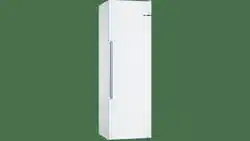Loading ...
Loading ...
Loading ...

Cleaning and servicing en
21
3. Take out all of the food and store it
in a cool place.
Place ice packs (if available) onto
the food.
4. "Remove all fittings from the appli-
ance." →Page21
Cleaning the appliance
Clean the appliance as specified to
ensure that it is not damaged by in-
correct cleaning or unsuitable clean-
ing products.
WARNING
Risk of electric shock!
¡ An ingress of moisture can cause
an electric shock.
▶
Do not use steam- or high-pres-
sure cleaners to clean the appli-
ance.
¡ Liquid in the lighting can be dan-
gerous.
▶
The rinsing water must not run
into the light.
ATTENTION!
¡ Unsuitable cleaning products may
damage the surfaces of the appli-
ance.
▶
Do not use hard scouring pads
or cleaning sponges.
▶
Do not use harsh or abrasive
detergents.
▶
Do not use cleaning products
with a high alcohol content.
¡ If you clean fittings and accessor-
ies in the dishwasher, this may
cause them to become deformed
or discolour.
▶
Never clean fittings and access-
ory in the dishwasher.
1. "Prepare the appliance for clean-
ing." →Page20
2. Clean the appliance, the fittings
and the door seals with a dish
cloth, lukewarm water and a little
pH-neutral washing-up liquid.
3. Dry thoroughly with a soft, dry
cloth.
4. Insert the fittings.
5. Electrically connect the appliance.
6. "Switch on the appliance."
→Page16
7. Putting the food into the appliance.
Removing the fittings
If you want to clean the fittings thor-
oughly, remove these from your ap-
pliance.
Removing the freezer compartment
shelf
▶
Pull out the freezer compartment
shelf and remove it.
Removing the frozen food container
1. Take out the frozen food container
as far as it will go.
2. Lift the frozen food container at the
front and remove it .
Loading ...
Loading ...
Loading ...
